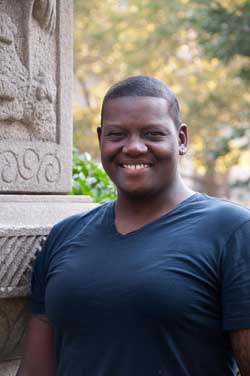Filed Under > TC Community
Modernizing the Army
A black female technology specialist has taught the military some new tricks, even as she's learned her trade
By Siddhartha Mitter
As the daughter of a high school principal and a fifth-grade English teacher, Karen-Nicole Knapper always figured she’d do something related to education. She just never imagined she’d do it through the U.S. Army.
Knapper, a native of Athens, Georgia and who holds a degree in psychology from Spelman College, embarked on her unlikely career path in 2001 after the death of her mother. Looking to exorcise her sadness through “a challenge and a big change,” she enlisted. Soon afterwards, the September 11 attacks occurred, and suddenly, Knapper found herself boarding a plane to Afghanistan.
“Six weeks after 9/11 I was headed to my first deployment,” says Knapper, who goes by Nicole. “It was like, are you kidding me? I was so afraid.”
Today, Knapper is an active-duty Army captain. She’s also a new TC student in the College’s master’s degree program in Instructional Media and Technology. It’s her first taste of civilian life in 11 years, and she’s nervous all over again.
“I almost don’t want to tell people my background,” she says, citing the mutual distrust that often exists between the military and civilian cultures in America today. Nevertheless, Knapper says that what she learned in the military has deeply influenced her as an educator, in particular shaping her mission to expand technology access and expertise for women and minorities in civilian and military life.
As a soldier, Knapper was assigned to “signal” – the military term for communications including all the radio, voice, computer and satellite systems that link units to one another and to soldiers in the field. She not only served in Afghanistan but was part of the first wave of U.S. forces to enter Iraq in 2003.
In the high-stakes setting of combat tactical support, Knapper not only discovered her love for technology, but also came to understand just how much technological innovation is driven by the military. “I wanted to do more, and not just the grunt work,” she says. She was accepted at the Officer Candidate School at Fort Benning, Georgia, and upon graduating, became a commissioned officer.
Redeploying to Afghanistan in command of a signal company, Knapper often flew on Chinook helicopters between remote Forward Operating Bases in the mountains on the Pakistan border. She faced regular mortar fire and was deeply affected when fellow soldiers were killed and grievously wounded. Her experiences earned her two Bronze Star Medals but also left her with the invisible scars of post-traumatic stress disorder.
“It’s very powerful in terms of the toll it takes,” Knapper says of her time at war. Yet she chose to extend her military career. During the past five years, working with the 84th Engineer Battalion in Hawaii, she has trained hundreds of soldiers in communications technology and overall skills. (In her spare time, she also has twice completed the grueling Ironman 70.3 triathlon.)
As an African-American woman from a progressive background who is at once a technology expert and a career Army officer, Knapper knows she represents a living challenge to a raft of stereotypes that endure in both military and civilian life.
“There’s a distinct lack of diversity in the technology field,” she says, adding bluntly that the military still is marked by plenty of institutionalized racism, sexism and homophobia, issues that limit soldiers’ horizons for growth and fulfillment.
“As an Army officer, it’s difficult to talk about these things in a very respectful way while at the same time challenging these attitudes,” Knapper says. Yet she is also a believer in change from within and credits advances such as the repeal of Don’t Ask Don’t Tell for making it easier to be a “voice for change” in the military.
While at TC, Knapper will split time between campus and the Army’s 10th Mountain Division at Fort Drum, near Syracuse. She says she is excited to learn skills that will make her a cutting-edge technology educator and help others, particularly women and minorities, to grow as technologists.
“That’s why I’m pursuing a degree in education,” she says. “I have a voice that needs to be heard and a perspective that has been missing.”
Published Friday, Aug. 31, 2012
